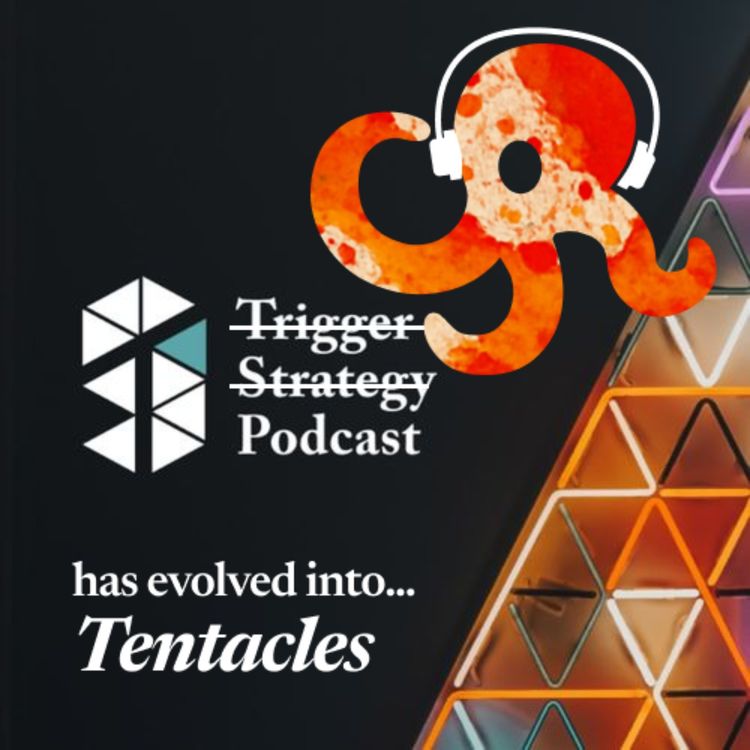Share

Trigger Strategy is now Tentacles
092: Twenty Twenty (Meta) Four
Season 1, Ep. 92
•
Brief notes today. This is kind of a wrap up of 2024 but not like others.
TL;DR: a garden decking disaster becomes a meaningful framing for rearchitecting our business.
What metaphor can you use to reframe your 2024?
Linky Goodness
More episodes
View all episodes

105. 105: We've rebranded... Trigger Strategy is now Tentacles by Crown & Reach
23:47||Season 1, Ep. 105Hands up, who else loves a spot of brand-flavoured navel-gazing? Two years ago we picked the company name Trigger Strategy Group in a last-minute scramble for our first client project. The name has, shall we say, one or two issues. (On the upside, it was a perfect example of Hard Test Easy Life: if you can make something work despite its flaws, you know you might be onto something.) But it was about time we gave things some proper thought.How naming a company in 20 minutes can haunt you for 2 yearsThe surprising violence baked into “trigger strategy” (thanks, game theory)The difference between command, control, and cephalopodsWhat bees, psychiatric hospitals, and chatGPT have in commonIn short, our company is now called Crown & Reach, and our podcast is called Tentacles.Why? To find out, you'll have to listen...References:Hard Test Easy Life https://triggerstrategy.substack.com/p/stop-polishing-turd-products-withInnovation Tactics Pip Deck https://pipdecks.com/products/innovation-tacticsDave Kang's Octopus Life https://davekang.substack.com/Taylorism - Frederick Taylor’s scientific management model Coherent Heterogeneity, a concept from complexity thinking https://cynefin.io/wiki/Common_fallaciesChildren of Time by Adrian TchaikovskyOther Minds by Peter Godfrey-SmithCrown & Reach Website https://crownandreach.com/
104. 104: Snakes in a cave, or why biases aren't bugs
35:27||Season 1, Ep. 104In which we sit in the garden, roast gently in the sun, and talk about cognitive biases, Panglossian optimism, Russian roulette, snakes on planes, and why most design is... fine actually. A very one-take kind of episode. Leaf-in-coffee energy throughout.Confirmation bias affects individuals. But if you want to harm an entire organisation, you need validation.You can be right, they can be right, or (more likely) you’re both missing something and a third way exists.Heuristics are usually good. It’s when you step into a new context that they betray you.Change start with acceptance. Weirdly, that’s when things can shift.Almost everything on our shelves is poorly designed in some way ... and yet it’s still there.Links, Ideas, and People ReferencedGary Klein – firefighter heuristic/pattern recognition story – more at https://youtu.be/QKpMLYwLRR4?si=8ie9txFbL__Q88gIDaniel Kahneman – cognitive biases, focusing illusionNora Bateson – snake instinct, context-specific intuition XKCD’s "10,000" Comic – https://xkcd.com/1053/Taylor Pearson on Ergodicity – https://taylorpearson.me/ergodicity/Prisoner's Dilemma – https://en.wikipedia.org/wiki/Prisoner%27s_dilemmaCandide by Voltaire – Dr. Pangloss and "all for the best" satireGary’s Economics (YouTube) – https://www.youtube.com/@garyseconomicsOliver Burkeman – stress, lateness, perspective10–10–10 Rule – “Will I care in 10 minutes, 10 months, 10 years?”
103. 103: Competence, control, and consequences
35:13||Season 1, Ep. 103You were hired to fix it. You did! Customers are happier. The company made millions. Your reward? They shut it all down.We sit on a garden bench and talk about those times when you feel like you're being punished for doing your job well.It turns out you can't mostly change a narrative with data. Your choices are power, influence, or acceptance.We share real stories, reflect on past mistakes, and explore safer (?) ways to inspire change when truth-telling gets you sidelined. Along the way: multiverse mapping, toddler psychology, and why the best performing landing pages often don't stay live.Books & Articles:Stealing the Corner Office by Brendan ReidPower: Why Some People Have It—and Others Don’t by Jeffrey PfefferWhy Design is Hard by Scott BerkunWhy Your Org Doesn’t Want Optimization to Succeed by Andrew AndersonHow to Win Friends and Influence People by Dale CarnegieRamit Sethi’s framing: “If someone is succeeding doing something that looks stupid… what do they know that I don’t?”Frameworks & Tools:“Show the thing to change the thing” – concept from John WillshireWardley MappingMultiverse Mapping (Trigger Strategy Substack)Play the hand you're dealt – "Don't start with what you want people to do. Start with what people want to do." – Dave TrottCharacter References:Wormtongue and Gandalf (Lord of the Rings) – models of influence
102. 102: Road Signs, Rapid Prototypes, and Productive Confusion
35:10||Season 1, Ep. 102While sipping homegrown bay leaf tea, we explore how road signs, surprises, and deliberate confusion can unlock better thinking.From missing signs under railway bridges to the tangled journey of Google Glass, we trace how aporia — the ancient art of being productively confused — can help you build faster, align better, and see the hidden struggles that are gonna derail your projects.Why some signs should disappear to make things flow betterHow "productive confusion" can trigger better decision makingWhat Google Glass, magic roundabouts, and fast food kitchens have in commonHow to rapid prototype a billion-dollar product... with clay and wireThe curse of "pseudolignment" and how to catch it before it wrecks your teamThe Align-o-matic: an emerging tool to help you spot hidden assumptions earlyLinky goodness:Magic Roundabout (Swindon, UK): https://en.wikipedia.org/wiki/Magic_Roundabout_(Swindon)"A symphony of efficiency, not a waste of motion" from The Founder: https://youtu.be/F-7cjdtrQ9Y?si=3eyzPlVq71Ws-R8oTom Chi rapid prototyping: https://youtu.be/d5_h1VuwD6g?si=h29WjP8xvX3vxPakRory Sutherland on defensive decision-making: https://fs.blog/defensive-decision-making/Zeigarnik Effect: https://en.wikipedia.org/wiki/Zeigarnik_effectWe may have confused Zeigarnik with Ovsiankina: https://en.wikipedia.org/wiki/Ovsiankina_effectInnovation Tactics cards we mentioned:Language Market Fit: front | backSolve for Distribution: front | backHard Test Easy Life: front | backTime Machine: front | backGet your copy of Innovation Tactics: https://pipdecks.com/products/innovation-tactics
101. 101: What's NOT emergent?
33:42||Season 1, Ep. 101We often talk about things being emergent in business, strategy, and life at large. The problem is, emergence can be kind of a pain to wrap your head around. And we were wondering: what if the starting point is what's NOT emergent? Does that help clarify what IS emergent?So we sat down in the garden and chatted it through. We landed on the discipline of conversion rate optimisation as an example of a business area where an understanding of emergence (and its opposite, if you could call it that) is fundamental to success or failure.Our conclusion was that it was indeed a helpful conversation, but we want to know – what do you think?Linky goodness:Andrew Anderson's website: https://testingdiscipline.com/Andrew Anderson's story about Comic Sans: https://cxl.com/blog/organizational-push-back/Dave Snowden and Cynefin: https://cynefin.io/wiki/CynefinSignals, Stories, Options: https://triggerstrategy.substack.com/p/signals-stories-optionsPivot Triggers: card front | backMultiverse Mapping: card front | back Tom's Pip Decks card deck, Innovation Tactics: https://pipdecks.com/products/innovation-tacticsMaster Multiverse Mapping (online course): https://multiversemapping.com/Episode 39 about Bounded Applicability https://shows.acast.com/triggerstrategy/episodes/663109cbcff31b0012ae9306
100. 100: Done 100 Thing!
43:12||Season 1, Ep. 100We made it to 100!Corissa and Tom look back over the year and a bit of podcasting and talk about what they've learned, some anecdotes, and some highlight episodes from along the way. They talk about allowing something to unfold into what it's meant to be, rather than trying to force a specific framework or result.Expect some of the usual themes: constraints, complexity, experimentation and psychology. And shout outs to Anna Brook, Louis Childs, Paul Tevis and all our lovely listeners.Linky goodness:Visakan Veerasamy's Do 100 Thing: https://www.visakanv.com/blog/do100things/Venkatesh Rao's Portals and flags: https://www.ribbonfarm.com/2014/06/25/portals-and-flags/Dave Snowden's Cynefin framework: https://cynefin.io/wiki/CynefinHenrik Karlsson's Unfolding: https://www.henrikkarlsson.xyz/p/unfoldingTom in JP Castlin's Strategy in Praxis: https://strategyinpraxis.substack.com/p/triggers-and-pivotsEpisodes mentioned:006: OKRs, moon landings and oil fires: https://shows.acast.com/triggerstrategy/episodes/663109cbcff31b0012ae9327018: a blustery annotated reading - A/B testing ain’t for settling your disagreements: https://shows.acast.com/triggerstrategy/episodes/663109cbcff31b0012ae931b019: North Star Metrics and Framework - are they “dumb”?: https://shows.acast.com/triggerstrategy/episodes/663109cbcff31b0012ae931a032: How Capable Leaders Navigate Uncertainty and Ambiguity - an annotated reading - Part 1: https://shows.acast.com/triggerstrategy/episodes/663109cbcff31b0012ae930d039: Bounded Applicability: https://shows.acast.com/triggerstrategy/episodes/663109cbcff31b0012ae9306040: Why isn’t [Role] doing what I think they should?: https://shows.acast.com/triggerstrategy/episodes/663109cbcff31b0012ae9305043: Do 100 Thing: https://shows.acast.com/triggerstrategy/episodes/043-do-100-thing044: The one with the bees: https://shows.acast.com/triggerstrategy/episodes/044-the-one-with-the-bees053: Smell the roses: https://shows.acast.com/triggerstrategy/episodes/053-smell-the-roses058: Reflections from UX London: https://shows.acast.com/triggerstrategy/episodes/058-reflections-from-ux-london060: Chesterton's vestigial doorman: https://shows.acast.com/triggerstrategy/episodes/060-chestertons-vestigial-doorman061: Tumbling into the Vision Chasm: https://shows.acast.com/triggerstrategy/episodes/061-tumbling-into-the-vision-chasm069: The alignment problem (not the AI alignment problem): https://shows.acast.com/triggerstrategy/episodes/069-the-alignment-problem-not-the-ai-alignment-problem070: Lobster dinner with a toddler: https://shows.acast.com/triggerstrategy/episodes/070-lobster-dinner-with-a-toddler081: Alignment alignment alignment: https://shows.acast.com/triggerstrategy/episodes/081-alignment-alignment-alignment086: How big things get done (part 1): https://shows.acast.com/triggerstrategy/episodes/086-how-big-things-get-done-part-1090: Should changing your mind mean changing your past work?: https://shows.acast.com/triggerstrategy/episodes/090-should-changing-your-mind-mean-changing-your-past-work
99. 099: Setting stable signals in a chaotic context
39:13||Season 1, Ep. 99We talk about signals. Specifically, how can you settle on success signals when your wider context is always changing? We talk about a small example: setting Pivot Triggers for our Multiverse Mapping course, while our context is always changing in terms of overall cashflow. When the runway is tight, we wish the course would hurry up and sell more, but how do we avoid over-reacting or putting all our eggs in one basket?We map that onto what happens in organisations when they need a new value stream to spool up quickly, how they can set unrealistic expectations, and how you can use something like Multiverse Mapping to figure out what's reasonable, and something like Pivot Triggers to help avoid sunk cost bias without having to be "the negative one".Linky goodness:J P Castlin's Strategy in PraxisGary's Economics – interview with Krishnan Guru MurthyIntro to Multiverse MappingMaster Multiverse MappingNotes on Chasm Crossing – a "better" version of the S-curve, because it shows the dip you'll feel in the early part of the curveSignals > Stories > OptionsEpisode 095: Enshittification
98. 098: Product Market Procrastination
29:31||Season 1, Ep. 98With one exercise, we can't predict whether your startup will succeed, but we can reliably predict if you're going to fail through procrastination.In this episode, we talk about mental blindspots. Corissa and Tom rib each other about their own mental blindspots. And we discuss how to pronounce the word "satiety"."It's more comfortable to fail when it's something you yourself have caused than when you fail at the hands of something that's outside your control." – Corissa“Hmm, I dunno, do you have any solutions that involve me doing everything 100% exactly like I'm doing it right now, and getting better outcomes?” – from Experimental History's So you wanna de-bog yourself.Can you detect any of these mental blindspots in yourself?Linky Goodness:Finish Your Projects - great, if winding article that inspired this episodeSo you wanna de-bog yourself - awesome articleTime Machine exercise Front | BackSnyder's Law neatly encapsulates one way founders procrastinateEpisode 077: Do you have to spend years in the pain cave?Can you stop the pendulum swinging? – where both ends of the pendulum swing encourage procrastination because they give you the illusion (or fact) of control and are comfortable to an MBA-worldviewBelief Whack-a-mole from David McRaney is in either You Are Not So Smart or How Minds Change ... anyone know for sure?Load bearing copes from Visakan Veerasamy
97. 097: Can you persuade a non-unfolder to try unfolding?
28:28||Season 1, Ep. 97A lovely, meandering conversation about the nature of success, the binds we often put ourselves in and more.Along the way, we touch on maverick musicians, maddening constraints, and McDonald's coffee.Linky Goodness:Henrik Karlsson's note: https://substack.com/@henrikkarlsson/note/c-95418840My note on his note: https://substack.com/profile/2368401-tom-kerwin/note/c-95543621Paul Millerd's Pathless Path: https://newsletter.pathlesspath.comNotes on an introduction to Christopher Alexander: https://www.edovanroyen.com/p/notes-of-ryan-singers-introduction-to-christopher-alexander